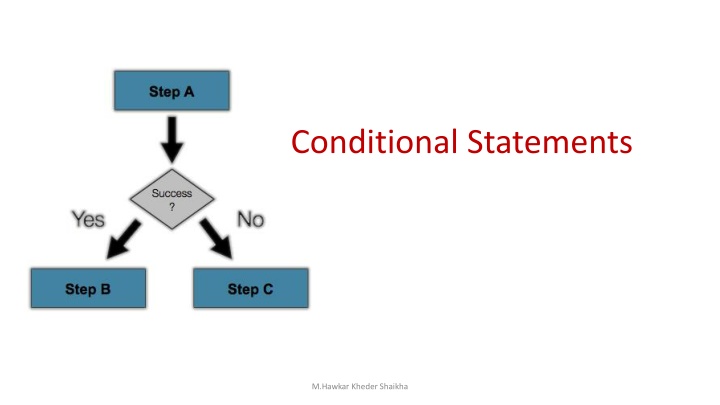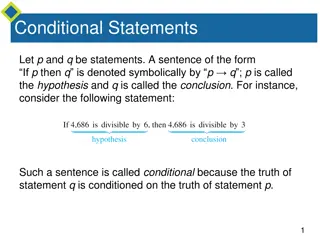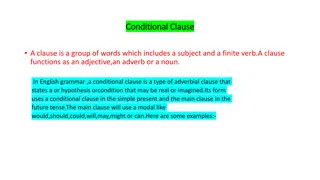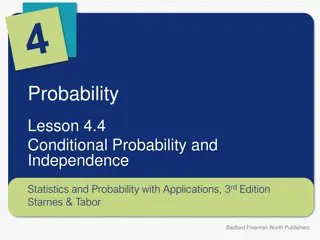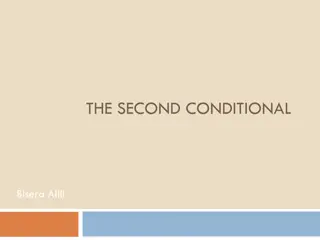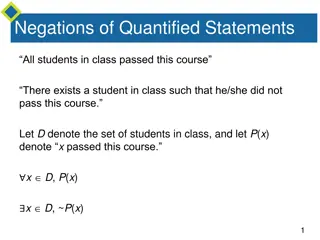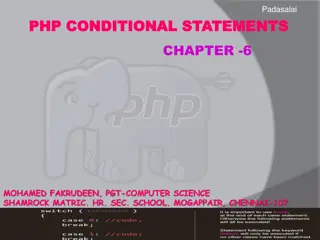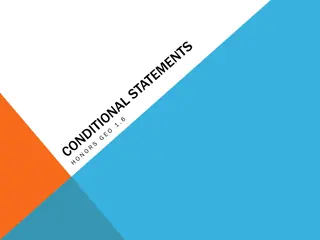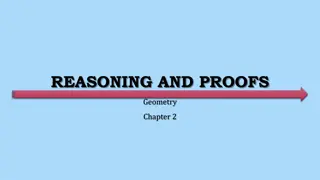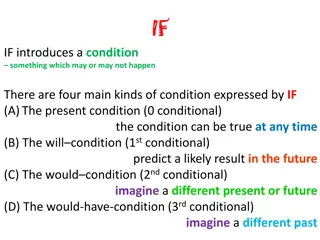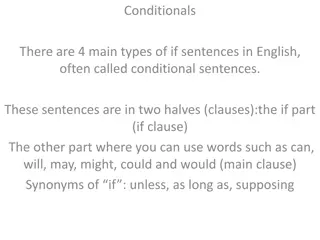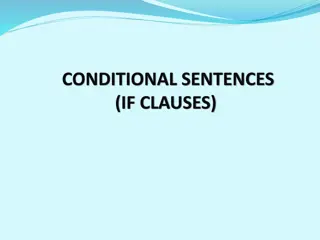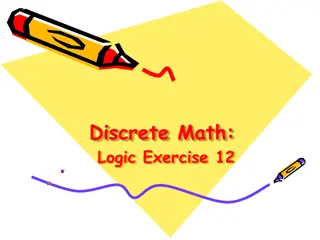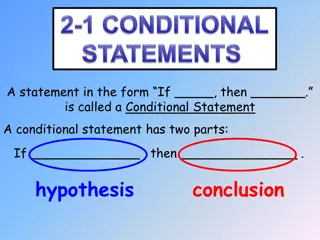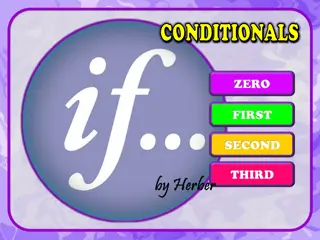Conditional Statements in C#
In this detailed guide, you will learn about comparison and logical operators, the if statement, if-else statement, nested if statements, and switch-case statement in C#. Explore examples and explanations of how conditional statements work, including how to use conditionals to control the flow of your code efficiently.
Download Presentation

Please find below an Image/Link to download the presentation.
The content on the website is provided AS IS for your information and personal use only. It may not be sold, licensed, or shared on other websites without obtaining consent from the author.If you encounter any issues during the download, it is possible that the publisher has removed the file from their server.
You are allowed to download the files provided on this website for personal or commercial use, subject to the condition that they are used lawfully. All files are the property of their respective owners.
The content on the website is provided AS IS for your information and personal use only. It may not be sold, licensed, or shared on other websites without obtaining consent from the author.
E N D
Presentation Transcript
Conditional Statements M.Hawkar Kheder Shaikha
Table of Contents 1. Comparison and Logical Operators 2. The if Statement 3. The if-else Statement 4. Nested if Statements 5. The switch-case Statement M.Hawkar Kheder Shaikha
Comparison Operators Operator Notation in C# Equals Not Equals Greater Than == != > Greater Than or Equals >= Less Than < Less Than or Equals <= M.Hawkar Kheder Shaikha
Example: Example: bool result = 5 <= 6; Console.WriteLine(result); // True Logical Operators Operator Logical NOT Notation in C# ! Logical AND && Logical OR Logical Exclusive OR (XOR) ^ || M.Hawkar Kheder Shaikha
if and if-else M.Hawkar Kheder Shaikha
The if Statement The most simple conditional statement Enables you to test for a condition Branch to different parts of the code depending on the result The simplest form of an if statement: if (condition) { statements; } M.Hawkar Kheder Shaikha
Condition and Statement The condition can be: Boolean variable Boolean logical expression Comparison expression The condition cannot be integer variable (like in C / C++) The statement can be: Single statement ending with a semicolon Block enclosed in braces M.Hawkar Kheder Shaikha
The condition is evaluated If it is true, the statement is executed If it is false, the statement is skipped M.Hawkar Kheder Shaikha
The if Statement Example static void Main(string[] args) { Console.WriteLine("Enter two numbers."); int biggerNumber = int.Parse(Console.ReadLine()); int smallerNumber = int.Parse(Console.ReadLine()); if (smallerNumber > biggerNumber) { biggerNumber = smallerNumber; } Console.WriteLine("The greater number is: {0}", biggerNumber); Console.ReadKey(); } M.Hawkar Kheder Shaikha
The if-else Statement More complex and useful conditional statement Executes one branch if the condition is true, and another if it is false The simplest form of an if-else statement: if (expression) { statement1; } else { statement2; } M.Hawkar Kheder Shaikha
if-else Statement Example Checking a number if it is odd or even ? static void Main(string[] args) { string s = Console.ReadLine(); int number = int.Parse(s); if (number % 2 == 0) { Console.WriteLine("This number is even."); } else { Console.WriteLine("This number is odd."); } Console.ReadKey(); } M.Hawkar Kheder Shaikha
Nested if Statements if and if-else statements can be nested, i.e. used inside another if or else statement. Every else corresponds to its closest preceding if. if (expression) { if (expression) { statement; } else { statement; } } else statement; M.Hawkar Kheder Shaikha
Always use { } blocks to avoid ambiguity Even when a single statement follows Avoid using more than three levels of nested if statements Put the case you normally expect to process first, then write the unusual cases Arrange the code to make it more readable M.Hawkar Kheder Shaikha
Example: static void Main(string[] args) { string s1 = Console.ReadLine(),s2=Console.ReadLine(); int first = int.Parse(s1); int second = int.Parse(s2); if (first == second) { Console.WriteLine( "These two numbers are equal."); } else { if (first > second) { Console.WriteLine( "The first number is bigger."); } else { Console.WriteLine("The second is bigger."); } } Console.ReadKey(); } M.Hawkar Kheder Shaikha
switch-case Making Several Comparisons at Once M.Hawkar Kheder Shaikha
The switch-case Statement Selects for execution a statement from a list depending on the value of the switch expression static void Main(string[] args) { string st = Console.ReadLine(); int day = int.Parse(st); switch (day) { case 1: Console.WriteLine("Monday"); break; case 2: Console.WriteLine("Tuesday"); break; case 3: Console.WriteLine("Wednesday"); break; case 4: Console.WriteLine("Thursday"); break; case 5: Console.WriteLine("Friday"); break; case 6: Console.WriteLine("Saturday"); break; case 7: Console.WriteLine("Sunday"); break; default: Console.WriteLine("Error!"); break; } Console.ReadKey(); } M.Hawkar Kheder Shaikha
How switch-case Works? 1. The expression is evaluated 2. When one of the constants specified in a case label is equal to the expression The statement that corresponds to that case is executed 3. If no case is equal to the expression If there is default case, it is executed Otherwise the control is transferred to the end point of the switch statement M.Hawkar Kheder Shaikha
Using switch: Rules Variables types like string, enum and integral types can be used for switch expression The value null is permitted as a case label constant The keyword break exits the switch statement "No fall through" rule you are obligated to use break after each case Multiple labels that correspond to the same statement are permitted M.Hawkar Kheder Shaikha
Exercises 1. Write an if statement that examines two integer variables and exchanges their values if the first one is greater than the second one. 2. Write a program that shows the sign of the product of three real numbers without calculating it. Use a sequence of if statements. 3. Write a program that finds the biggest of three integers using nested if statements. 4. Sort 3 real values in descending order using nested if statements 5. Write program that asks for a digit and depending on the input shows the name of that digit (in English) using a switch statement. M.Hawkar Kheder Shaikha
6. Write a program that enters the coefficients a, b and c of a quadratic equation a*x2 + b*x + c = 0 and calculates and prints its real roots. Note that quadratic equations may have 0, 1 or 2 real roots. 7- Write a program that finds the greatest of given 5 variables. 8. Write a program that, depending on the user s choice inputs int, double or string variable. If the variable is integer or double, increases it with 1. If the variable is string, appends "*" at its end. The program must show the value of that variable as a console output. Use switch statement. 9. We are given 5 integer numbers. Write a program that checks if the sum of some subset of them is 0. Example: 3, -2, 1, 1, 8 1+1-2=0. M.Hawkar Kheder Shaikha
10. Write a program that applies bonus scores to given scores in the range [1..9]. The program reads a digit as an input. If the digit is between 1 and 3, the program multiplies it by 10; if it is between 4 and 6, multiplies it by 100; if it is between 7 and 9, multiplies it by 1000. If it is zero or if the value is not a digit, the program must report an error. Use a switch statement and at the end print the calculated new value in the console. 11. * Write a program that converts a number in the range [0...999] to a text corresponding to its English pronunciation. Examples: 0 "Zero" 273 "Two hundred seventy three" 400 "Four hundred" 501 "Five hundred and one" 711 "Severn hundred and eleven" M.Hawkar Kheder Shaikha
